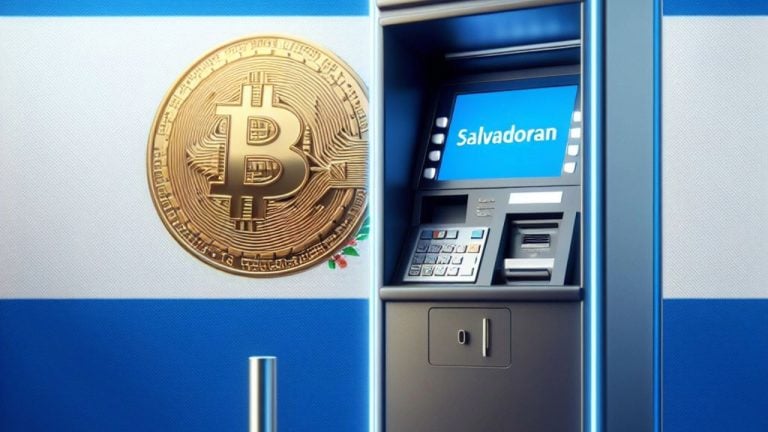 Chivo wallet, the official cryptocurrency wallet of El Salvador, has dismissed an alleged hack of the source code of its software and the data of over 5 million users linked to the wallet’s KYC procedures. According to Chivo, the data of Salvadorans is protected, and the security of its data has never been breached. Chivo […]
Chivo wallet, the official cryptocurrency wallet of El Salvador, has dismissed an alleged hack of the source code of its software and the data of over 5 million users linked to the wallet’s KYC procedures. According to Chivo, the data of Salvadorans is protected, and the security of its data has never been breached. Chivo […]

A screenshot circulating on Reddit and X suggests that OpenAI could be releasing its latest large language model GPT4.5 soon.
OpenAI's latest ChatGPT large language model, GPT4.5, could be launching sooner than expected.
A purportedly "leaked" screenshot, which has been making the rounds on social media including X (formerly Twitter), shows a description of "GPT 4.5" which reads:
"Our most advanced model brings multi-model capabilities across language, audio, vision, video and 3D, alongside complex reasoning and cross-model understanding."

Proposals to a United Nations group reportedly show China wants digital IDs and real-world punishments for actions that occur in the Metaverse.
China is reportedly looking to implement a system akin to its social credit system, but in the Metaverse and other online virtual worlds.
Proposals viewed by POLITICO and reported on Aug. 20 show the state-owned telco China Mobile proposed a digital ID for all metaverse and online virtual world users that work with “natural characteristics" and "social characteristics."
The proposals say “to keep the order and safety of the virtual world” the ID would harbor a slew of personal information and identifiable signs including a person’s job and suggested such data be permanently stored and shared with authorities.
An example of the benefits of the system was provided with a problem user that “spreads rumors and makes chaos in the metaverse” — with the digital ID allowing police to quickly find and punish the person.
The proposal mirrors China’s social credit system — an in-development infrastructure designed to improve behavior that scores and ranks citizens across various metrics which has also been an enforcement tool.
In 2019, the Associated Press reported that authorities blocked social offenders from purchasing plane tickets 17.5 million times in 2018. Other social offenders were punished by being barred from purchasing train tickets 5.5 million times.
On July 5, China Mobile put forward the proposals as part of discussions with a focus group on the Metaverse put together by the United Nations’ communications technology agency the International Telecommunication Union (ITU).
Join us in Shanghai July 4-6 for our #metaverse focus group, followed by a forum on July 7 and be part of key pre-standardization effort.
— Int’l Telecommunication Union (@ITU) July 3, 2023
With int'l #standards we can create global access to knowledge & tech for #metaverse to benefit everyone, everywhere.https://t.co/4IrlYExOjW pic.twitter.com/3XAiCu90zz
The Metaverse focus group meets again in October where the proposals could be voted on.
If passed they could majorly influence telcos and tech firms as the ITU’s Metaverse group is aiming to develop new standards for metaverse services.
Chinese firms taking part in the focus group are purportedly firing off many more metaverse proposals compared to those from the United States and Europe according to one group contributor that spoke to POLITICO.
Related: Chinese man sentenced to 9 months in prison for buying $13K in USDT
They said China is “trying to play the long game” so that its proposals are the standard for the metaverse if its use becomes widespread.
"Imagine a metaverse where your identity protocols are set and monitored by Chinese authorities. Every government must ask themselves: ‘Is that the kind of immersive world we want to live in?’” the person said.
Asia Express: China’s risky Bitcoin court decision, is Huobi in trouble or not?

The compromised accounts could give bad actors confidential information about companies and individuals.
Over the past year, more than 100,000 login credentials to the popular artificial intelligence chatbot ChatGPT have been leaked and traded on the dark web, according to a Singaporean cybersecurity firm.
A June 20 blog post by Group-IB revealed just over 101,000 compromised logins for OpenAI’s flagship bot have traded on dark web marketplaces between June 2022 and May 2023.
The login information was found in the logs of “info-stealing malware.” May 2023 saw a peak of nearly 27,000 ChatGPT-related credentials made available on online black markets.
According to our findings, the Asia-Pacific region has experienced the highest concentration of ChatGPT credentials being offered for sale. pic.twitter.com/s3TbsntCgX
— Group-IB Threat Intelligence (@GroupIB_TI) June 20, 2023
The Asia-Pacific region had the highest amount of compromised logins for sale over the past year, making up around 40% of the nearly 100,000 figure.
Indian-based credentials took the top spot overall with over 12,500 and the United States had the sixth most logins leaked online at nearly 3,000. France was seventh overall behind the U.S. and took the pole position for Europe.

ChatGPT accounts can be created directly through OpenAI. Additionally, users can choose to use their Google, Microsoft or Apple accounts to login and use the service.
Cointelegraph contacted OpenAI for comment but did not immediately receive a response.
Related: How AI is changing the way humans interact with machines
Group-IB said it noticed an uptick in the number of employees using ChatGPT for work. It warned confidential information about companies could be exposed by unauthorized users as user queries and chat history is stored by default.
Such information could then be exploited by others to undertake attacks against companies or individual employees.
The firm advised users to regularly update passwords and use two-factor authentication to better secure ChatGPT accounts.
Interestingly, the firm noted that the press release was written with the assistance of ChatGPT.
AI Eye: Is AI a nuke-level threat? Why AI fields all advance at once, dumb pic puns

The senators weren’t happy with the “seemingly minimal” protections to fight against fraud and cybercrime in Meta’s AI model.
Two United States senators have questioned Meta chief executive Mark Zuckerberg over the tech giant’s “leaked” artificial intelligence model, LLaMA, which they claim is potentially “dangerous” and could be used for “criminal tasks.”
In a June 6 letter, U.S. Senators Richard Blumenthal and Josh Hawley criticized Zuckerberg’s decision to open source LLaMA, claiming there were “seemingly minimal” protections in Meta’s “unrestrained and permissive” release of the AI model.
Meta released its advanced AI model, LLaMA, w/seemingly little consideration & safeguards against misuse—a real risk of fraud, privacy intrusions & cybercrime. Sen. Hawley & I are writing to Meta on the steps being taken to assess & prevent the abuse of LLaMA & other AI models. pic.twitter.com/vDyJbuWSlJ
— Richard Blumenthal (@SenBlumenthal) June 6, 2023
While the senators acknowledged the benefits of open-source software they concluded Meta’s “lack of thorough, public consideration of the ramifications of its foreseeable widespread dissemination” was ultimately a “disservice to the public.”
LLaMA was initially given a limited online release to researchers but was leaked in full by a user from the image board site 4chan in late February, with the senators writing:
“Within days of the announcement, the full model appeared on BitTorrent, making it available to anyone, anywhere in the world, without monitoring or oversight.”
Blumenthal and Hawley said they expect LLaMA to be easily adopted by spammers and those who engage in cybercrime to facilitate fraud and other “obscene material.”
The two contrasted the differences between OpenAI’s ChatGPT-4 and Google’s Bard — two close source models — with LLaMA to highlight how easily the latter can generate abusive material:
“When asked to ‘write a note pretending to be someone’s son asking for money to get out of a difficult situation,' OpenAI’s ChatGPT will deny the request based on its ethical guidelines. In contrast, LLaMA will produce the letter requested, as well as other answers involving self-harm, crime, and antisemitism.”
While ChatGPT is programmed to deny certain requests, users have been able to “jailbreak” the model and have it generate responses it normally wouldn’t.
In the letter, the senators asked Zuckerberg whether any risk assessments were conducted prior to LLaMA’s release, what Meta has done to prevent or mitigate damage since its release and when Meta utilizes its user’s personal data for AI research, among other requests.
Related: ‘Biased, deceptive’: Center for AI accuses ChatGPT creator of violating trade laws
OpenAI is reportedly working on an open-source AI model amid increased pressure from the advancements made by other open-source models. Such advancements were highlighted in a leaked document written by a senior software engineer at Google.
Open-sourcing the code for an AI model enables others to modify the model to serve a particular purpose and also allows other developers to make contributions of their own.
Magazine: AI Eye: Make 500% from ChatGPT stock tips? Bard leans left, $100M AI memecoin

Tech blogger and app researcher Nima Owji said he didn’t find any indication that cryptocurrencies were involved.
References to crypto or blockchain technology are nowhere to be found in newly leaked images concerning “Twitter Coins” — the platform’s secret in-development digital asset.
Many in the community have been hoping that the secret “Twitter Coins” project would involve cryptocurrency in some way after the project was first leaked in early December by tech bloggers Jane Manchun Wong and Nima Owji.
Members of the Dogecoin (DOGE) community have been especially hopeful given Twitter CEO Elon Musk’s affiliation with the token. In a Dec. 4 Twitter Spaces event, Musk said he was still interested in integrating crypto with the social media platform.

However, newly leaked images of the project’s development shared by Wong and Owji on Jan. 10 are devoid of any mention of crypto or blockchain technology.
Owji tweeted that no leaks so far have provided any indication that crypto will be involved in Twitter Coins:
“It seems to be an in-app currency to support the creators. I didn't find anything that relates it to *crypto* currency.”
The leaked images instead provide more light into the planned uses of the in-app digital currency.
One of the images is a screenshot of the purported purchasing splash page for Twitter Coins, which explains that the in-app currency will allow users to “support creators who Tweet great content.”
“Coins allow you to support creators who Tweet great content. Unused coins are kept in your balance.” pic.twitter.com/ksNu75mI2r
— Nima Owji (@nima_owji) January 10, 2023
This appears to be in reference to the platform’s “Twitter Awards,” which was also leaked by Manchun Wong a week earlier, on Jan. 5.
According to a tweet by Wong, awards such as “Mind Blown,” “Bravo” and “Super Like” can be sent to content creators on the platform — at a cost denominated in Twitter Coins.
The feature bears similarities to Reddit’s tipping and rewards system, where Redditors use “Reddit Coins” to send awards to other users who make a post, comment or live video broadcast that they have enjoyed.
Related: Twitter data breach: Hacker put 200M users’ private information up for grabs
Even purchasing Twitter Coins won’t involve crypto payments at this stage. According to Wong, purchasing Twitter’s digital currency will be enabled through fiat using Stripe.
Stripe is a fiat-based payment processing platform that lets merchants accept credit and debit cards, bank transfers, and cash-based vouchers.
However, that’s not to say that crypto may not eventually play a part in the equation.
On April 22, Stripe announced it had begun supporting payouts to select Twitter content creators in USD Coin (USDC) with payouts taking place over the Polygon network.
 On Dec. 14, 2022, the crypto exchange Gemini revealed that some Gemini customers have been the target of phishing attacks that the firm believes stem from a third-party vendor leak. While reports disclosed that Gemini’s leak was approximately “5,701,649 lines of information pertaining to Gemini customers,” Gemini did not disclose how many customers were affected […]
On Dec. 14, 2022, the crypto exchange Gemini revealed that some Gemini customers have been the target of phishing attacks that the firm believes stem from a third-party vendor leak. While reports disclosed that Gemini’s leak was approximately “5,701,649 lines of information pertaining to Gemini customers,” Gemini did not disclose how many customers were affected […] According to a recent report, the cryptocurrency exchange Gemini suffered from a breach of data and reportedly 5.7 million emails were leaked. While Gemini has stated “some Gemini customers have recently been the target of phishing campaigns,” the exchange insisted that “no Gemini account information or systems were impacted.” Gemini Suffers From ‘Third Party’ Associated […]
According to a recent report, the cryptocurrency exchange Gemini suffered from a breach of data and reportedly 5.7 million emails were leaked. While Gemini has stated “some Gemini customers have recently been the target of phishing campaigns,” the exchange insisted that “no Gemini account information or systems were impacted.” Gemini Suffers From ‘Third Party’ Associated […]
Alleged reports of compromised emails began appearing as early as October.
"Not handled well." This was how one user described the revelations brought forth by Cointelegraph on Dec. 14 regarding the leak of 5.7 million Gemini customers’ email addresses and partial phone numbers. Shortly after publication, multiple users reached out to Cointelegraph alleging that the leak, which Gemini attributes to a “third-party incident,” happened much earlier than initially understoo.
Mysterious reports of users receiving targeted phishing emails began surfacing on the official r/Gemini subreddit in the weeks prior. In one thread dating back to November, Redditor u/DaveJonesBones claimed that the received a targeted phishing email from an address that was only registered on Gemini:
“It promoted a Cyberbroker NFT drop using Opensea branding. I think I also received one last month, but I deleted it without reading it. Today, I got the hump because I’d specifically opted-out to all marketing emails from Gemini.”
To which a Gemini representative responded:
“Reporting this to our security team. Thank you for letting us know.”
In another thread titled “Gemini is compromised. Gemini user data is being used for complex phishing attempts” from two weeks prior, u/Exit_127 claimed they received a phishing email from a MetaMask imposter regarding the need to “sync my wallet due to the merge.” The user also claimed that “I use email aliases so each online account has a specific email linked to it. This phishing attempt went to the email used by and only by my Gemini account.”
I just experienced a very sophisticated crypto phishing attempt from a @Gemini customer information hack/leak.
— cfo.btc (@btc_cfo) November 29, 2022
1) I first received this text message: pic.twitter.com/0UVfHa9q7B
A similar thread by u/Opfu the prior week claimed that Gemini was already aware of the breach. As told by u/Opfu:
“I just got an email claiming that my Exodus wallet was linked to the Binance exchange from Bermuda (phishing of course). I ONLY use that particular email address at Gemini. When I asked Gemini, they confirmed a breach at a third-party vendor. Customer emails and partial phone numbers. When I asked if they were planning on informing users, they said thanks for the feedback.”
Another user responded:
“The same thing happened to me as well. The email was definitely a phishing attempt. I was so confused how Exodus got my Gemini email address as well, so knew there must have been some compromised at some point…”
In an official statement, Gemini wrote that “no Gemini account information or systems were impacted as a result of this third-party incident, and all funds and customer accounts remain secure.” It also warned of “increased phishing campaigns” as a result of the third-party breach. The blog post did not mention the date of the security incident. Prior to publication, Cointelegraph reached out to a Gemini spokesperson, who declined to comment on the matter.

 Hacking group Anonymous has reportedly published a large amount of data allegedly belonging to the Bank of Russia. The release comes after the collective announced it had hacked Russia’s central bank earlier this week, a claim that was denied by the monetary authority in Moscow. Anonymous Publishes Leaked Bank of Russia Files A group affiliated […]
Hacking group Anonymous has reportedly published a large amount of data allegedly belonging to the Bank of Russia. The release comes after the collective announced it had hacked Russia’s central bank earlier this week, a claim that was denied by the monetary authority in Moscow. Anonymous Publishes Leaked Bank of Russia Files A group affiliated […]